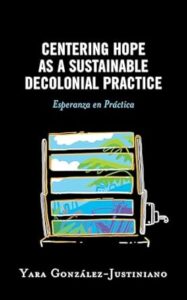The last two decades in Puerto Rico have been especially bleak. After experiencing an economic crisis (2006), bankruptcy and the imposition of a fiscal oversight board (2016), the passing of two Category 5 hurricanes (2017), protests to demand the resignation of a governor (2019), an earthquake (2020), and the Covid-19 pandemic (2020), it is not at all surprising to observe how pessimism has taken over the collective imagination of the inhabitants of Puerto Rico. The work of Yara González-Justiniano thus comes at a critical time when Puerto Rican society needs “wells” to turn to in order to find fresh waters of hope. Indeed, in Centering Hope as a Sustainable Decolonial Practice: Esperanza en Práctica, González-Justiniano proposes a theology of hope for the Puerto Rican context, which, as the subtitle of the book says, is a hope that manifests itself in practice.
The first chapter is a historical account of the socio-historical context of the island, emphasizing the colonial relationship with the USA. Following, in the second chapter, she delves into a conversation with three theologians of hope, Rubem Alves, Ellen Ott Marshall and Jürgen Moltmann, to “set[s] the stage for articulating contextual understandings of hope” (17). The third chapter presents the results of her ethnographic research a few months after two hurricanes devastated the island. In the fourth chapter, González-Justiniano invites us to think about liberation theology through acts of creation and imagination. This distinction is vital in the context of Puerto Rico, since the exodus of Puerto Ricans is to leave their land and their people to go to work in the empire. In the last chapter, she presents two models of sustainable hope to resist and keep us in la lucha.
Using ethnographic research and critical theologies and theories, González-Justiniano proposes a proyecto de país that “argues for a systemic ecclesial approach to other institutions and forms of civic participation that are able to attend to the source of problems and not their symptoms” (102). This work will require us to have hope at the center of our praxis, for as González-Justiniano states, “Hope is not an afterthought;” (97) but a human ontological quality central to our everyday struggle. Hope is an axis that nourishes our actions and motivations (97).
A central point of González-Justiniano’s argument, following the work of Brazilian theologian Rubem Alves, is that “the imagination of a new and liberated future can only come from the oppressed” (19). This point is emphasized in her second model for sustainable hope. The model begins with the variant Oppression Perspective (OP) which emphasizes that “the oppressed are those who do not accommodate to current conditions and can identify what is missing to stop suffering and oppression” (100). And it cannot be otherwise, only the “wretched of the earth,” in Fanon’s words, who suffer oppression in their own flesh are the ones who have the urgency to imagine new futures (16). It is in the midst of this oppression that hope does not allow us to resign ourselves to the present suffering but manifests itself in the stubborn belief that something new may be possible. In that manner, hope gives way to the imagination to come into action acting as an “engine that shows that there are other ways of organizing and being” (100).
González-Justiniano’s Centering Hope is a contribution to ecclesial studies where the Christian churches of Puerto Rico can find a practical resource to help and inspire them in their daily work. Moreover, it offers the academy a resource to better understand the context of Puerto Rico and the possible responses that can emerge from the communities themselves. In short, it is a useful resource for anyone who thirsts for hope. I conclude with a quote from Teresa Delgado that, in my opinion, beautifully summarizes the spirit of this book: “Blessed are those who continue to hope beyond all hope, for they will be called the architects of a free and joyful life” (96).
Drew University




